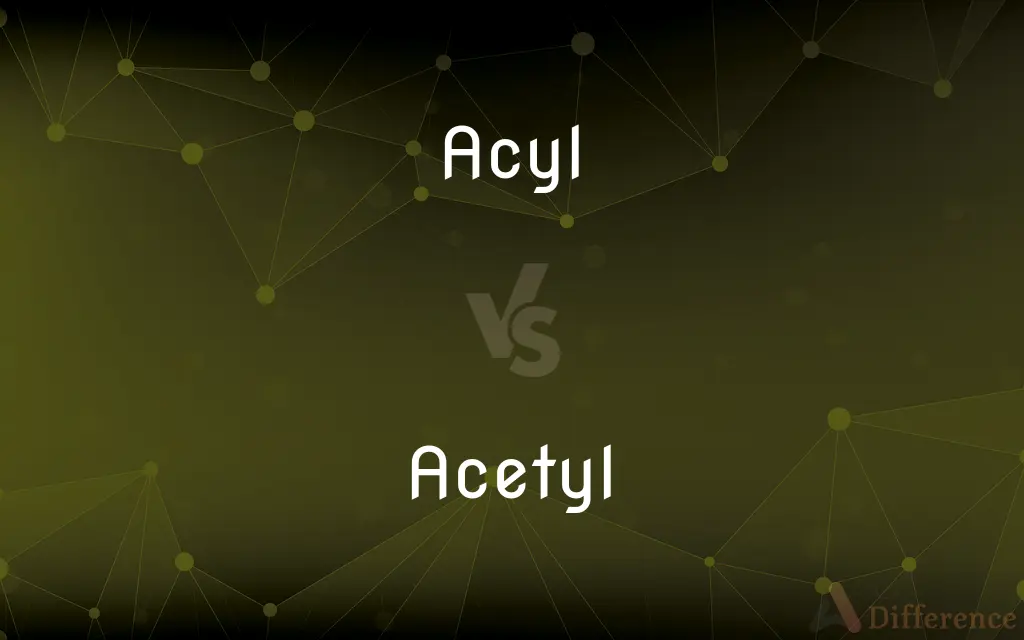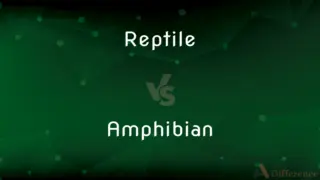Acyl vs. Acetyl — What's the Difference?
Edited by Tayyaba Rehman — By Fiza Rafique — Updated on September 25, 2023
Acyl is a functional group derived from carboxylic acids; Acetyl is a specific type of acyl derived from acetic acid.

Difference Between Acyl and Acetyl
Table of Contents
ADVERTISEMENT
Key Differences
Acyl and Acetyl both pertain to organic chemistry, denoting functional groups found in various compounds. Acyl represents a broader category of organic compounds derived from carboxylic acids by removing a hydroxyl group. This group can be associated with different acids, thus giving rise to a variety of acyl groups.
Acetyl, on the other hand, is a more specific subset of acyl. It is derived specifically from acetic acid, making it a particular kind of acyl group. While acyl can form diverse compounds such as acyl chlorides or acyl anhydrides, depending on the acid it originates from, acetyl's reference is primarily towards compounds linked to acetic acid.
In summary, acyl denotes a wider range of compounds derived from various carboxylic acids, while acetyl is specifically related to acetic acid.
Comparison Chart
Derived from
Carboxylic acids.
Specifically acetic acid.
General Formula
RCO-
CH3CO-
ADVERTISEMENT
Representation
A broader category of organic compounds.
A specific type of acyl group.
Examples of Derivatives
Acyl chloride, acyl anhydride.
Acetyl chloride, acetyl anhydride.
Relation
General term for functional groups derived from acids.
A particular instance of an acyl group.
Compare with Definitions
Acyl
A functional group derived from carboxylic acids.
Acyl groups are central to the formation of acyl chlorides in organic synthesis.
Acetyl
The moiety formed by removing a hydroxyl group from acetic acid.
Acetyl groups modify histones, affecting DNA expression.
Acyl
A carbonyl group bonded to an alkyl or aryl group.
The acyl group is vital in the formation of esters and amides.
Acetyl
An organic compound with the formula CH3CO-.
Acetyl coenzyme A is crucial in cellular metabolism.
Acyl
A general term for a variety of compounds in organic chemistry.
An acyl anhydride is a reactive compound used in many syntheses.
Acetyl
A specific acyl group derived from acetic acid.
Acetyl groups are integral in the synthesis of acetylcholine, a neurotransmitter.
Acyl
Represents compounds missing a hydroxyl group from carboxylic acids.
Acyl compounds play a significant role in many chemical reactions.
Acetyl
Represents the acylation product of acetic acid.
Acetyl groups can modify proteins in the process of acetylation.
Acyl
Refers to the presence of the -CO- functional group.
Acyl halides are a category of compounds having a halogen atom attached.
Acetyl
A common derivatizing agent in organic synthesis.
Acetyl chloride is used to introduce the acetyl group into organic substrates.
Acyl
An organic group having the general formula RCO-, derived from an organic acid.
Acetyl
The methyl acyl group, CH3CO, formally derived from acetic acid.
Acyl
(organic chemistry) Any of class of organic radicals, RCO-, formed by the removal of a hydroxyl group from a carboxylic acid.
Acetyl
(organic chemistry) The univalent radical CH3CO- derived from acetic acid.
Acyl
An acid radical, as acetyl, malonyl, or benzoyl. An acyl radical can be depicted as R-CO-, where -CO- is the carbonyl group, and R is the group that characterizes the acyl moiety.
Acetyl
A complex, hypothetical radical, composed of two parts of carbon to three of hydrogen and one of oxygen. Its hydroxide is acetic acid.
Acyl
Any group or radical of the form RCO- where R is an organic group;
An example of the acyl group is the acetyl group
Acetyl
The organic group of acetic acid (CH3CO-)
Common Curiosities
Is Acetyl specifically linked to any molecule?
Yes, acetyl is specifically linked to acetic acid.
Can Acyl and Acetyl be used interchangeably?
No, while acetyl is a type of acyl, not all acyl groups are acetyl.
Are there other specific types of acyl groups besides acetyl?
Yes, depending on the parent acid, there are various specific acyl groups like propionyl, butyryl, etc.
Is Acetyl a type of Acyl?
Yes, acetyl is a specific type of acyl group derived from acetic acid.
What’s the significance of Acetyl in biology?
Acetyl coenzyme A plays a vital role in metabolism, and acetylation can modify proteins.
Is Acetyl involved in gene expression?
Yes, acetylation of histones by acetyl groups can influence gene expression.
What's an example of an acetyl compound?
Acetyl chloride is a commonly referenced acetyl compound.
Why is the distinction between Acyl and Acetyl important?
The distinction is crucial for accurate representation in chemical reactions and organic synthesis.
Can acyl groups form chains?
Yes, in fats and oils, acyl groups form long chains called fatty acids.
What is the general formula for Acyl?
The general formula for acyl is RCO-.
Are acyl groups found in fats?
Yes, triglycerides are esters of glycerol and acyl groups from fatty acids.
In which reactions is acetyl commonly involved?
Acetyl groups are commonly involved in acetylation reactions.
Is the acetyl group larger than the methyl group?
Yes, the acetyl group (CH3CO-) is larger than the methyl group (CH3-).
Are acyl groups reactive?
Yes, they often participate in organic reactions, especially acylation.
What role does Acetyl play in cellular respiration?
Acetyl coenzyme A is a key molecule in the Krebs cycle in cellular respiration.
Share Your Discovery

Previous Comparison
Reptile vs. Amphibian
Next Comparison
Cod vs. PollockAuthor Spotlight
Written by
Fiza RafiqueFiza Rafique is a skilled content writer at AskDifference.com, where she meticulously refines and enhances written pieces. Drawing from her vast editorial expertise, Fiza ensures clarity, accuracy, and precision in every article. Passionate about language, she continually seeks to elevate the quality of content for readers worldwide.
Edited by
Tayyaba RehmanTayyaba Rehman is a distinguished writer, currently serving as a primary contributor to askdifference.com. As a researcher in semantics and etymology, Tayyaba's passion for the complexity of languages and their distinctions has found a perfect home on the platform. Tayyaba delves into the intricacies of language, distinguishing between commonly confused words and phrases, thereby providing clarity for readers worldwide.
















































